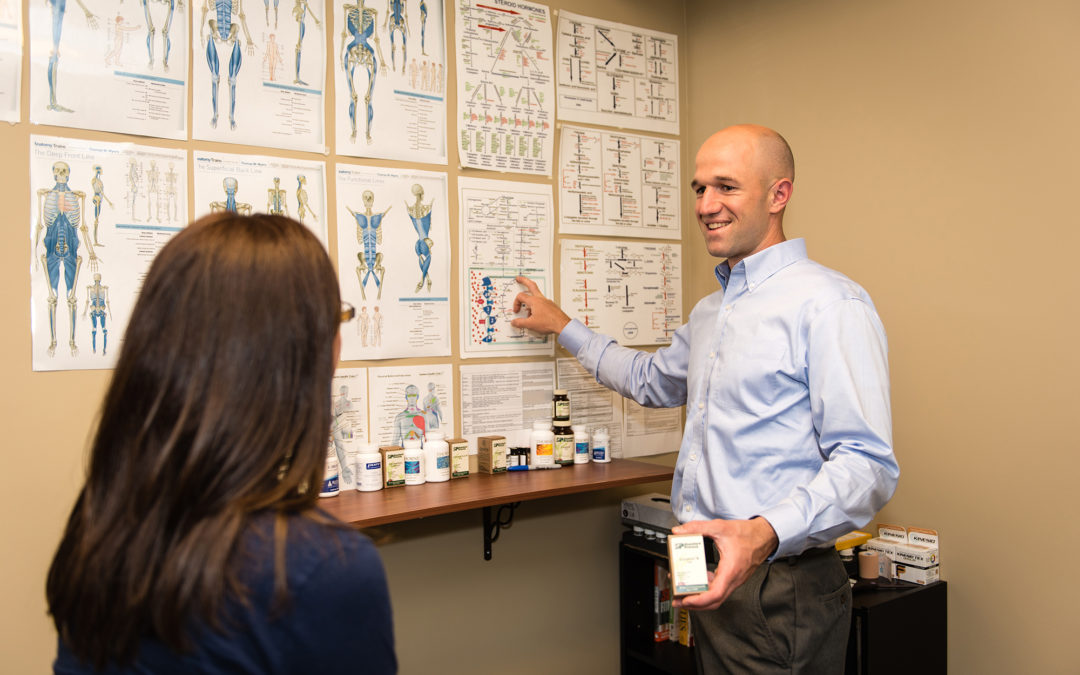Nutritional Supplementation can be a very controversial topic. In an ideal world none of us would require supplements because we would be consuming nutrient rich diets, while getting plenty of sunlight, rest, and exercise. Unfortunately, that is not the case for most of us. In my clinical practice, I treat a variety of conditions from painful joints to digestive complaints. Without supplements it would be very difficult to successfully treat many conditions. However, I have also seen how supplements can be misused and detrimental. Below I have listed 5 myths about nutritional supplements that I have seen in my clinical practice.
- I need to take this supplement forever – In most cases you should not have to take a supplement forever, however, for most people once they start taking something they never stop. There are exceptions to this rule but for the most part supplementation should be used to correct an imbalance in your biochemistry. But if you are taking something for a long enough the imbalance should be corrected and often times a person will be in excess of the nutrient they are taking. In addition, a need for a supplement means that there needs to be a change in your lifestyle. Taking the supplement can help pull you out of hole you may be in, but over time you want to try figure out why the need for the supplement occurred in the first place.
- I cannot take too much Vitamin D – many people do show a need for Vitamin D especially at this time of year, however, that does not mean that taking large doses (Over 5,000 i.u.) is a healthy option for everyone. Truthfully, Vitamin D should be coming from the sun and not in pill form, hence it is in very few foods. Many health providers say that Vitamin D levels should be between 50-80ng/ml. However, I would say it is probably closer to 50ng/ml, and that the ideal level will be different for everyone. If you are lighter skinned you can get by with lower Vitamin D levels. Everything in life and health is all about balance, taking too much Vitamin D can cause a Vitamin A deficiency. Vitamin A is crucial for skin, eye, lungs, and gut health, and it is one of the most common supplements that I have to prescribe. It is often needed because people do not eat enough fat but it can be caused by excessive Vitamin D. Lastly, take your Vitamin D supplements around noon and with fats, the fat will increase the absorption and around noon is when we are supposed to be getting our Vitamin D anyways.
- I need to take Vitamin C – most vitamin C supplements I would not recommend because most consist of large doses of Ascorbic Acid. While Ascorbic acid is often used synonymously with vitamin C, there are additional factors that should be considered part of the vitamin C complex such as bioflavonoids. Taking a large ascorbic acid dose will cause a deficiency in those other aspects of the Vitamin C complex, thus causing a Vitamin C deficiency. For example, the amount of ascorbic acid in an orange is fairly small, if you were to eat an orange that contained 1,000 mg of ascorbic acid it would be the size of a basketball. You are better off eating plenty of fruits and vegetables and if Vitamin C is needed, I recommend these two brands, Cataplex C and Camu Supreme.
- For healthy bones, I need to take a calcium supplement – Calcium deficiencies exist but they are not as common as people think. Osteopenia and osteoporosis are not exclusively calcium deficiency diseases. Calcium intake in the U.S. is one of the highest in the world yet our incidence of osteoporosis is among the highest. Excessive calcium intake can cause deficiencies in other minerals such as Magnesium, Zinc and Phosphorus. Clinically speaking, Magnesium and Zinc deficiencies are the most common mineral deficiencies I encounter. Also, the type of calcium supplement is very important. Calcium carbonate is a common form of calcium supplementation but is poorly absorbed and really taxes your digestive system. Calcium lactate, citrate, or glucorate are the best forms of supplemental calcium. My suggestion to increase calcium levels is to add green, leafy vegetables to your diet.
- All supplements are created equal – recently, the New York Attorney General is investigating Target, Walmart, GNC, and Walgreens for selling supplements with false ingredients and amounts. This is evidence that the brand of supplement you purchase is extremely important. Supplements sold exclusively through health professionals are often more expensive but they are usually of higher quality and have undergone strict 3rd party testing. The brands that I offer in my practice are Thorne Research, Biotics Research, Standard Process, Pure Encapsulations, Supreme Nutrition, Metagenics, and Designs for Health.
The purpose of this article is not to scare the public away from nutritional supplements but people need to understand that supplements are not risk-free. Supplementation is no substitute for a healthy diet and lifestyle but people will be best served by working with a professional that can provide specific guidance as to which supplements to take and for how long. Try to understand the purpose behind each supplement you are taking then hopefully you can work towards not needing that supplement in the future.
Dr. Cooley is a Doctor of Chiropractic, who specializes in functional biochemistry and functional neurology. His practice is located in Buffalo, NY, for more information see his website www.cooleydc.com.
